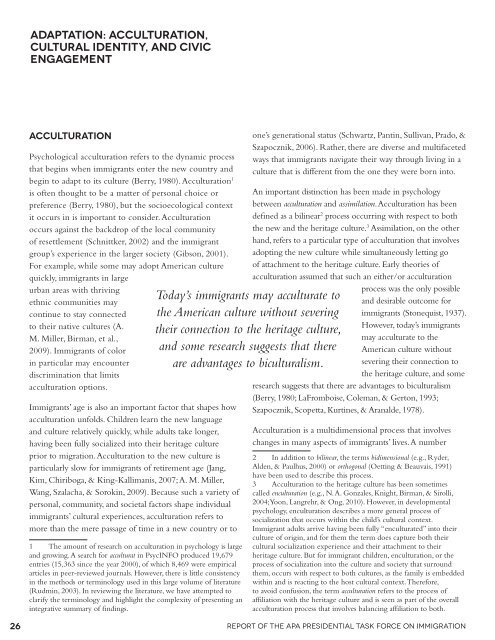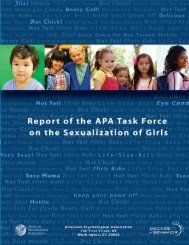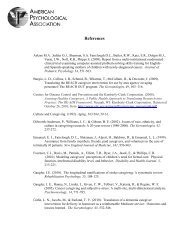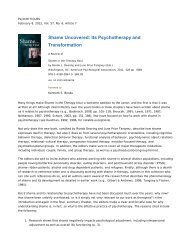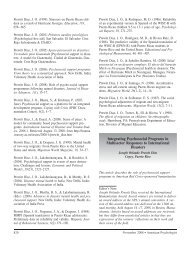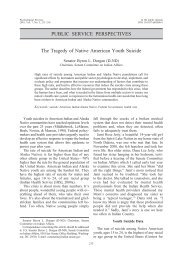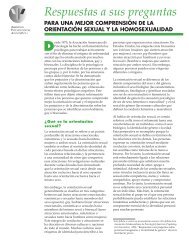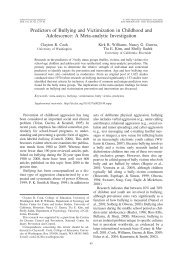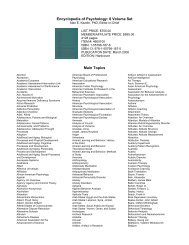Crossroads: The Psychology of Immigration in the New Century
Crossroads: The Psychology of Immigration in the New Century
Crossroads: The Psychology of Immigration in the New Century
You also want an ePaper? Increase the reach of your titles
YUMPU automatically turns print PDFs into web optimized ePapers that Google loves.
adaptation: acculturation,<br />
Cultural Identity, and Civic<br />
Engagement<br />
acculturation<br />
Psychological acculturation refers to <strong>the</strong> dynamic process<br />
that beg<strong>in</strong>s when immigrants enter <strong>the</strong> new country and<br />
beg<strong>in</strong> to adapt to its culture (Berry, 1980). Acculturation 1<br />
is <strong>of</strong>ten thought to be a matter <strong>of</strong> personal choice or<br />
preference (Berry, 1980), but <strong>the</strong> socioecological context<br />
it occurs <strong>in</strong> is important to consider. Acculturation<br />
occurs aga<strong>in</strong>st <strong>the</strong> backdrop <strong>of</strong> <strong>the</strong> local community<br />
<strong>of</strong> resettlement (Schnittker, 2002) and <strong>the</strong> immigrant<br />
group’s experience <strong>in</strong> <strong>the</strong> larger society (Gibson, 2001).<br />
For example, while some may adopt American culture<br />
quickly, immigrants <strong>in</strong> large<br />
urban areas with thriv<strong>in</strong>g<br />
ethnic communities may<br />
cont<strong>in</strong>ue to stay connected<br />
to <strong>the</strong>ir native cultures (A.<br />
M. Miller, Birman, et al.,<br />
2009). Immigrants <strong>of</strong> color<br />
<strong>in</strong> particular may encounter<br />
discrim<strong>in</strong>ation that limits<br />
acculturation options.<br />
Immigrants’ age is also an important factor that shapes how<br />
acculturation unfolds. Children learn <strong>the</strong> new language<br />
and culture relatively quickly, while adults take longer,<br />
hav<strong>in</strong>g been fully socialized <strong>in</strong>to <strong>the</strong>ir heritage culture<br />
prior to migration. Acculturation to <strong>the</strong> new culture is<br />
particularly slow for immigrants <strong>of</strong> retirement age (Jang,<br />
Kim, Chiriboga, & K<strong>in</strong>g-Kallimanis, 2007; A. M. Miller,<br />
Wang, Szalacha, & Sorok<strong>in</strong>, 2009). Because such a variety <strong>of</strong><br />
personal, community, and societal factors shape <strong>in</strong>dividual<br />
immigrants’ cultural experiences, acculturation refers to<br />
more than <strong>the</strong> mere passage <strong>of</strong> time <strong>in</strong> a new country or to<br />
1 <strong>The</strong> amount <strong>of</strong> research on acculturation <strong>in</strong> psychology is large<br />
and grow<strong>in</strong>g. A search for acculturat <strong>in</strong> PsycINFO produced 19,679<br />
entries (15,363 s<strong>in</strong>ce <strong>the</strong> year 2000), <strong>of</strong> which 8,469 were empirical<br />
articles <strong>in</strong> peer-reviewed journals. However, <strong>the</strong>re is little consistency<br />
<strong>in</strong> <strong>the</strong> methods or term<strong>in</strong>ology used <strong>in</strong> this large volume <strong>of</strong> literature<br />
(Rudm<strong>in</strong>, 2003). In review<strong>in</strong>g <strong>the</strong> literature, we have attempted to<br />
clarify <strong>the</strong> term<strong>in</strong>ology and highlight <strong>the</strong> complexity <strong>of</strong> present<strong>in</strong>g an<br />
<strong>in</strong>tegrative summary <strong>of</strong> f<strong>in</strong>d<strong>in</strong>gs.<br />
Today’s immigrants may acculturate to<br />
<strong>the</strong> American culture without sever<strong>in</strong>g<br />
<strong>the</strong>ir connection to <strong>the</strong> heritage culture,<br />
and some research suggests that <strong>the</strong>re<br />
are advantages to biculturalism.<br />
one’s generational status (Schwartz, Pant<strong>in</strong>, Sullivan, Prado, &<br />
Szapocznik, 2006). Ra<strong>the</strong>r, <strong>the</strong>re are diverse and multifaceted<br />
ways that immigrants navigate <strong>the</strong>ir way through liv<strong>in</strong>g <strong>in</strong> a<br />
culture that is different from <strong>the</strong> one <strong>the</strong>y were born <strong>in</strong>to.<br />
An important dist<strong>in</strong>ction has been made <strong>in</strong> psychology<br />
between acculturation and assimilation. Acculturation has been<br />
def<strong>in</strong>ed as a bil<strong>in</strong>ear 2 process occurr<strong>in</strong>g with respect to both<br />
<strong>the</strong> new and <strong>the</strong> heritage culture. 3 Assimilation, on <strong>the</strong> o<strong>the</strong>r<br />
hand, refers to a particular type <strong>of</strong> acculturation that <strong>in</strong>volves<br />
adopt<strong>in</strong>g <strong>the</strong> new culture while simultaneously lett<strong>in</strong>g go<br />
<strong>of</strong> attachment to <strong>the</strong> heritage culture. Early <strong>the</strong>ories <strong>of</strong><br />
acculturation assumed that such an ei<strong>the</strong>r/or acculturation<br />
process was <strong>the</strong> only possible<br />
and desirable outcome for<br />
immigrants (Stonequist, 1937).<br />
However, today’s immigrants<br />
may acculturate to <strong>the</strong><br />
American culture without<br />
sever<strong>in</strong>g <strong>the</strong>ir connection to<br />
<strong>the</strong> heritage culture, and some<br />
research suggests that <strong>the</strong>re are advantages to biculturalism<br />
(Berry, 1980; LaFromboise, Coleman, & Gerton, 1993;<br />
Szapocznik, Scopetta, Kurt<strong>in</strong>es, & Aranalde, 1978).<br />
Acculturation is a multidimensional process that <strong>in</strong>volves<br />
changes <strong>in</strong> many aspects <strong>of</strong> immigrants’ lives. A number<br />
2 In addition to bil<strong>in</strong>ear, <strong>the</strong> terms bidimensional (e.g., Ryder,<br />
Alden, & Paulhus, 2000) or orthogonal (Oett<strong>in</strong>g & Beauvais, 1991)<br />
have been used to describe this process.<br />
3 Acculturation to <strong>the</strong> heritage culture has been sometimes<br />
called enculturation (e.g., N. A. Gonzales, Knight, Birman, & Sirolli,<br />
2004; Yoon, Langrehr, & Ong, 2010). However, <strong>in</strong> developmental<br />
psychology, enculturation describes a more general process <strong>of</strong><br />
socialization that occurs with<strong>in</strong> <strong>the</strong> child’s cultural context.<br />
Immigrant adults arrive hav<strong>in</strong>g been fully “enculturated” <strong>in</strong>to <strong>the</strong>ir<br />
culture <strong>of</strong> orig<strong>in</strong>, and for <strong>the</strong>m <strong>the</strong> term does capture both <strong>the</strong>ir<br />
cultural socialization experience and <strong>the</strong>ir attachment to <strong>the</strong>ir<br />
heritage culture. But for immigrant children, enculturation, or <strong>the</strong><br />
process <strong>of</strong> socialization <strong>in</strong>to <strong>the</strong> culture and society that surround<br />
<strong>the</strong>m, occurs with respect to both cultures, as <strong>the</strong> family is embedded<br />
with<strong>in</strong> and is react<strong>in</strong>g to <strong>the</strong> host cultural context. <strong>The</strong>refore,<br />
to avoid confusion, <strong>the</strong> term acculturation refers to <strong>the</strong> process <strong>of</strong><br />
affiliation with <strong>the</strong> heritage culture and is seen as part <strong>of</strong> <strong>the</strong> overall<br />
acculturation process that <strong>in</strong>volves balanc<strong>in</strong>g affiliation to both.<br />
26 Report <strong>of</strong> <strong>the</strong> APA Presidential Task Force on <strong>Immigration</strong>


